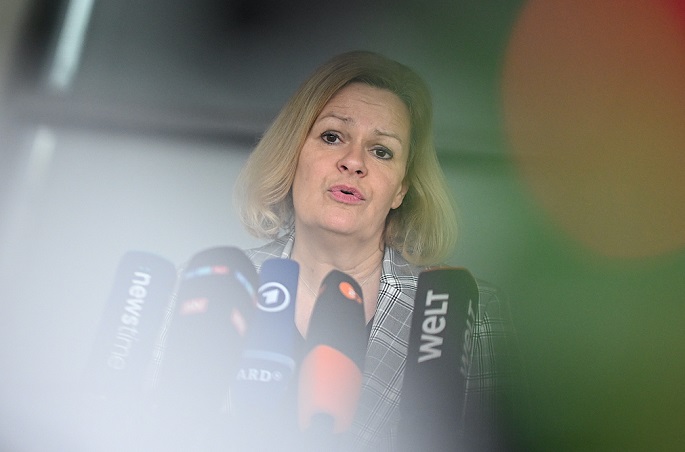3rd-country asylum deals won't be a 'game changer': German minister
Published : 21 Jun 2024, 00:23
German Interior Minister Nancy Faeser dampened expectations for possible deals to process asylum claims outside the EU on Thursday, arguing that it's unlikely any scheme would change the situation Germany faces.
Efforts such as Italy's deal to send some asylum-seeking migrants to Albania would not be a "game changer" for asylum policy and wouldn't make a discernible impact on the number of people seeking asylum, Faeser said on Thursday while meeting with interior ministers from Germany's 16 federal states just outside Berlin.
Some German politicians have been pushing the country to pursue a similar plan in hopes of reducing the number of asylum-seeking migrants in the country.
In Albania, "a maximum limit of 3,000 refugees has been agreed there. That is a very small number," Faeser said.
She also pointed to the United Kingdom, which has been working for 18 months to launch a similar deal to send refugees to Rwanda. Faeser said those efforts still haven't yielded a viable model either.
Instead, Germany needs to rely on recent reforms to the common EU asylum system, GEAS, to handle migrants. She cited the possibility of faster asylum procedures at the EU's external borders and a fairer distribution of refugees among EU countries.
"These external border procedures ... will massively relieve the burden on us here," Faeser said.
Michael Stübgen, the interior minister in the eastern state of Brandenburg, also expressed scepticism about third-country schemes. The conservative politician said the UK's costly experience with Rwanda has not been encouraging.
"This is a possible project that will be very complicated, which will also not be easy to arrange legally," said Stübgen. "But I am happy to be convinced that it should be tried."
Scholz to address state leaders
German Chancellor Olaf Scholz is separately consulting with the leaders of Germany's 16 states in Berlin on Thursday, where issues of irregular migration are expected to be on the top of the agenda.
Faeser is also expected to present the results of a review by her ministry on possible legal options and models for a third-party asylum arrangement. The question of which country might be prepared to accept asylum seekers from Germany has not yet been addressed.
Some conservative opposition lawmakers from the CDU/CSU bloc have been calling for Scholz's government to strike such a deal, something that human rights and migrant advocacy groups have sharply criticized.
Another major topic of discussion has been possibly resuming deportations of Afghans and Syrians from Germany who have been convicted of serious criminal offences or are suspected of being radical Islamists.
Germany halted deportations to Afghanistan after the Taliban, a radical Islamist group, seized power over the country in August 2021.
But resuming deportations to Afghanistan and war-torn Syria has been a hot-button issue in Germany, particularly in the wake of the slaying of a policeman by a knife-wielding Afghan migrant during an attack in the German city of Mannheim in May.
Scholz came out in favour of resuming deportations to both countries.
Clarity on deportations to Syria, Afghanistan 'soon'
Faeser on Thursday expressed confidence that the country will soon find ways to deport immigrants convicted of serious crimes or deemed Islamist threats to Afghanistan and Syria.
"We are in concrete negotiations on this and are confident that we will be able to achieve this for this group," Faeser said.
There are only a small number of such people, Faeser stressed. She said the German government is examining the extent to which repatriation via neighbouring countries would be possible in the case of Afghan nationals, citing Uzbekistan as a country that had been previously discussed.
However, Faeser did not want to publicly name any countries with which talks are ongoing out of fears of "jeopardizing the concrete negotiations we are currently conducting."


